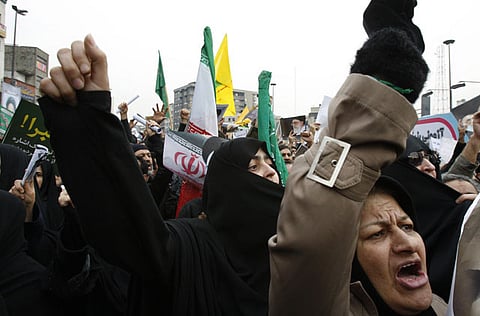West is obsessed with Iran
Why is it that there is so much coverage of the protests, while other events are ignored?

The world's preoccupation with anything that carries an Iranian label on it is evident. All it takes is a quick glance at headlines in newspapers and it will soon become apparent that news related to Iran is of major interest, not only to Western media, but in the Arab world too. Whether it be a new missile test causing anxiety, a provocative statement from Iranian President Mahmoud Ahmadinejad, speculation about an "imminent" Israeli attack on Iran's nuclear sites, Iranian defiance of the International Atomic Energy Agency, or speculations of a power struggle between two groups Westerners see as hardliners and moderate, news from Iran always makes headlines.
Amongst the abundant coverage, there are numerous exaggerated accounts and misinformation. A former member of the US Department of State staff, a fellow at the Washington Institute for Near East Study who also taught a summer graduate course at George Washington University, told our class that, according to ‘confirmed and reliable sources', Ahmadinejad made major policy decisions by opening the Quran and randomly selecting a page and then a sentence. He would then take inspiration from one word of the chosen sentence and decide what course of action to take.
Outrageous
The above claim may be outrageous, but so is the West's recent obsession with the recent Iranian protests. The funeral of dissident cleric Grand Ayatollah Hussain Ali Montazeri turned into a protest against the government. Despite being a supporter of democracy and particularly interested in civic engagement and mass empowerment, I am very worn out by the seemingly disproportionate coverage.
That Iranians are not content with their government is neither surprising nor unexpected. On an economic level, domestic criticism of Ahmadinejad's policy has dominated newspapers for some time, with numerous reports highlighting soaring prices and high unemployment. In a study carried out in 2008 by the Iranian parliament, 90 per cent of those interviewed identified inflation and high prices as the biggest problems. Housing and unemployment were also major concerns.
Iranian grievances against their government are not new, and the existence of a bloc opposed to Ahmadinejad and Supreme Leader Ayatollah Ali Khamenei, has been discussed at length in Western circles. So what made recent events so important?
I respect the lives of the eight dead and feel with the hundreds detained, but in the same period a number of human-rights violations, threats of prosecution and undemocratic and suppressive practices were made by the government and did not receive the same attention. This was most likely because highlighting such stories would not advance the political agenda.
The degree of coverage, including provocative photos and headlines would make one think that the Iranian protests were the major event of 2009. But as the Iranian protesters took to the streets, Vietnam sentenced a dissident to five years in prison as part of a general crackdown. Chinese Vice Minister for Public Security Yang Huanning vowed there would be "pre-emptive attacks" to counter threats to Communist Party control. In South Africa, xenophobic violence against other Africans is a recurring problem, spreading from city to city. Meanwhile, the Chinese government's execution of a mentally disturbed British Muslim for drug smuggling received little interest from regional and international press, with the exception of Britain. There was little comment from Muslim imams.
Uproar
Somehow, Twitter and Facebook photo uploads have become reliable sources, enough to raise an uproar in the Western media. Journalists have decried the inhuman treatment of protesters who were categorised as "fighting and dying for liberty". Calls for the US to support the protesters as a "matter of principle" have apparently had the desired effect. US President Barack Obama issued a statement supporting the protesters and strongly condemning the violence and unjust suppression of innocent Iranian citizens.
Why didn't the US react when on December 27 Thailand sent troops with batons to evict some 4,000 ethnic Hmong asylum-seekers? And why didn't we hear such strong language from Obama during Israel's deadly attack on Gaza?
I guess "life, liberty and the pursuit of happiness" is not meant for everyone.
Dina Khanat is an Arab-American writer based in Dubai.



